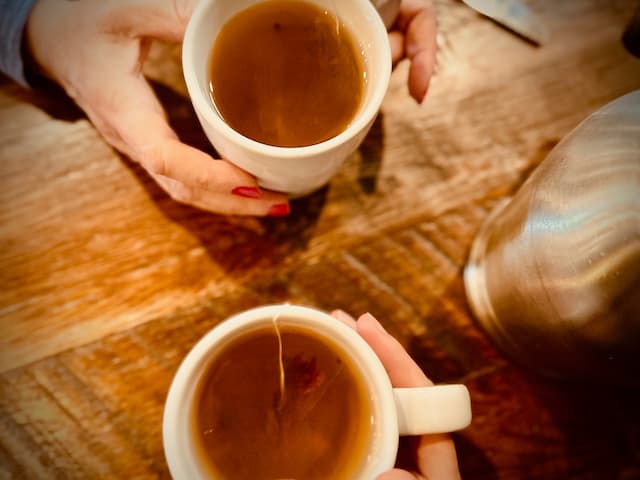Hygge, on Earth as in Heaven? - Joyfully Pressing On
Here we are traveling and our home is a distant home in another world…
Though we meet with traveler's fare sometimes yet it should not be grievous to us….
Consider what your condition is, you are pilgrims and strangers, so do not think to satisfy yourselves here.
—Jeremiah Burroughs, The Rare Jewel of Christian Contentment
What’s Not To Love About Hygge?
I’ve been wrestling this week. I mean really grappling, straining to pin two ideas down right. HYGGE (or “hue-guh“) is on one side of the ring. It’s the Danish word for comfy coziness, and the feeling of contentment and well-being (Anna Altman, The New Yorker) that mightcome as you savor that Gevalia Gold Roast with your Bible and journal open on a sunny Saturday morning.
On the other side of the ring of my mind is SELF-DENIAL. As in, go out in the dark 2 degree cold this morning because you’ve offered to do the carpool after work and it’ll be too late to get out then. As in, “If anyone would come after me, let him deny himself and take up his cross daily and follow me” (Luke 9:23).
Hygge is my good friend’s word of the year and was the subject of my workplace inservice last week.
What’s not to love about it? Shouldn’t Christians be all about hygge?
Is Hygge Living “As An Enemy of the Cross”?
But this morning I read this.
For, as I have often told you before and now tell you again even with tears, many live as enemies of the cross of Christ. Their destiny is destruction, their god is their stomach, and their glory is in their shame. Their mind is set on earthly things.
Paul, Philippians 3:18-19 (NIV)
Their God is their stomach? Their mind is set on earthly things? What? Is that hygge I hear?
Theologian D.A. Carson explains, “There’s no principle of self-denial. There’s no no sold-out principle to die daily for the sake of the gospel.”
Which isn’t to say hygge isn’t a lovely thing. Only to say that idols form when, in Tim Keller’s words, we turn a good thing into an ultimate thing. (These 4 questions can help identify our idols.)
Hygge may not be idol, but comfort, health or security might.
Hygge, on Earth as in Heaven?
Carson continues,
Far from being drawn to suffer for Christ’s sake, they are endlessly drawn to creature comforts. Their mind is on earthly things. It’s not as if they focus on immoral, wicked things. Rather all their values and cherished goals and wishes are tied to what belongs to this earth.
Christianity prepares people for heaven. It is not about getting it all now. Someone said, Christians are “later people.” The meek will inherit the earth. Those who mourn will be comforted. Those who hunger and thirst for righteousness will be filled. These blessings will come later.
So does being a “later” person mean we have to hold out till heaven to enjoy hygge?
No. But whether or not we see ourselves as pilgrims on a journey and travelers passing through has everything to do with how we handle hygge. It determines whether we give thanks or grumble. Because pilgrims don’t grumble.
Here’s what I mean.
At Home Or On The Road?
When we are at home, we demand our just-right sleep number bed and just-right fluffy enough pillows. The thermostat is set so high and no higher and the food is just right. At home we can have it our way.
But when we’re on the road as overnight guests, we make do. We put up with a too-flat pillow or a rock-hard bed, grateful for a place to stay. We’ll endure the stiff neck and sore back because we’ll be in our own bed next week.
It’s the same with travel food. We don’t expect hygge on the road. We eat what’s put out for us—mushy French toast or weak French roast, runny eggs or rubbery yolks. It’s not how we fix them at home, but that’s okay. We’ll eat and drink what’s set before us because we are travelers, on our way.
At home, we will feast.
Hygge In Another Man’s House?
This metaphor is not new. Four hundred years ago Puritan Jeremiah Burroughs wrote,
If a man travels, perhaps he does not meet with conveniences as he desires, yet this thought may moderate his spirit: I am a traveler and I must not be finding fault, I am in another man’s house, and it would be bad manners to find fault in someone else’s house, even though things are not as much to my liking as at home. So they are contented while away with the thought that it shall be different when they come home…Thus it should be with us in this world…here we are traveling, and our home is a distant home in another world.
Our earth is another man’s house, and there is Christ-like self-denial.
But There Is Also Honey-Almond Peach Tea
Hygge tonight is sitting with my smart-wooled feet up, a mug of hot, honey-almond peach tea between my knees, a short stack of books and journals beside me and a Dorothy Sayers mystery in my hands.
All the while a wood fire crackles in the stove as Wisconsin winds blow wild. Oh, and there’s some happy Irish folk behind me.
As hyggeligt as all that is here at “home,” I don’t think we will ever feel completely comfy and cozy in this life, if only because we know this life won’t last. The world is not our home. We are “pilgrims” (Hebrews 11:13), travelers en route to a better country. I know this is true.
And Pleasant Inns Along The Way
But I also know—I mean, “experience” know—that God is kind and good. He gives us countless pleasures in this life. C. S. Lewis captured this idea.
The settled happiness and security which we all desire, God withholds from us by the very nature of the world: but joy, pleasure, and merriment He has scattered broadcast…It is not hard to see why. The security we crave would teach us to rest our hearts in this world…: a few moments of happy love, a landscape, a symphony, a merry meeting with friends, a bathe or a football match, have no such tendency. Our Father refreshes us on the journey with some pleasant inns, but will not encourage us to mistake them for home.
The Problem of Pain
Hygge is a pleasant inn. Enjoy it.
Hygge is a pleasant inn. Enjoy it. Embrace your creatureliness, Joe Rigney wrote. Go embrace the fact that creation is a magic glass, the kind that allows you to see God more clearly the thicker it becomes. Embrace your body and your five senses and the wonders that they can perceive and receive in the world…
Anchor yourself in a supreme and expanding love for God and go enjoy his gifts.
Share them. Create that place. Refresh some souls.
Enjoy God’s gifts and give him thanks.
Italian Hygge And Prison Fare
But you’re still wondering, who won that wrestling match—HYGGE or SELF-DENIAL?
Well, back to the Bible for that.
Paul wrote to the Philippians, that he knew how to deny himself and make do at the inn. But he also knew about hygge. He didn’t call it hygge. The Danes hadn’t coined it yet. Paul said, instead, that he knew, “how to abound.”
I think Paul enjoyed some Italian hygge, some fine wine and bruschetta.
I know Paul handled prison fare. He was in prison when he wrote his letter to the Philippians, about learning to be content in any and every circumstance.
Jesus knew both too. Foxes have holes and birds have nests, he said, but the Son of Man has no place to lay his head (Matthew 8:20). He came to serve (Matthew 20:28) and to pour himself out (Philippians 2:7-8).
Still, I think Jesus relished Judean hygge. Picture him reclined at Matthew’s table and resting in Mary and Martha’s hospitality. He enjoyed good gifts enough that his enemies accused him of being a glutton and drunkard (Matthew 11:19).
On earth, Jesus knew the delights of his senses, even as he obeyed unto death. He knew hygge and self-denial. I think it’s safe to say his followers will too.
Back in the ring, that’s why hygge and self-denial tie.
Our citizenship is in heaven, and we eagerly wait for a Savior from there, the Lord Jesus Christ.
Philippians 3:20




